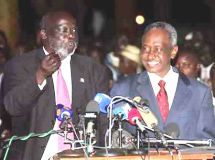Sudan’s VP: Darfur easier to resolve than south war
KHARTOUM, Sudan, Jan 17, 2005 (AP) — Sudan’s top negotiator in the Darfur conflict told tribal leaders from the war-torn region that the conflict was easier to resolve compared to the civil war in the south, according to remarks published Monday.

|
|
Rebel Sudan People’s Liberation Movement (SPLM) John Garang (L) addresses the crowd next to Sudanese First Vice President Ali Osman Mohamed Taha (R) at the signing ceremony for the last two of eight peace protocols in Naivasha on December 31, 2004. (Reuters). . |
The Sudanese government recently signed a peace agreement with southern rebels to end a 21-year civil war. However, the government and rebels continue to clash in a separate conflict in the northern region of Darfur, which has killed tens of thousands and displaced millions.
“If in the south-north negotiations we were able to reach a common ground, then we are much more capable and much more nearer to reach such a common ground in the north-north dialogue,” said Vice President Ali Osman Mohamed Taha, according to the official Sudan Media Center. Taha’s remarks came during a meeting on Sunday in Khartoum with Darfur tribal leaders.
Sudanese President Omar el-Bashir last week said the Darfur peace talks would be handled by Taha, who was praised for hammering out a peace deal with the Sudan People’s Liberation Army, the rebels in the south.
Taha said his government was determined to find common ground with rebels and reach a peace deal, according to the SMC. He also reiterated his government’s stance that it would abide by a cease-fire in Darfur and facilitate the work of the humanitarian groups, and he urged rebel groups to do the same.
Rebel groups in Darfur and the government have accused each other of breaking largely ignored cease-fire agreements.
Last week Jan Pronk, the top U.N. envoy to Sudan, told the U.N. Security Council that the security situation in Darfur “is still bad” with militias and rebels rearming and the conflict spreading.
The Darfur conflict was sparked in February 2003 when two non-Arab African rebel groups took up arms to fight for more power and resources.The government responded with a counterinsurgency campaign in which the Janjaweed, an Arab militia, has committed wide-scale abuses against the African population.
